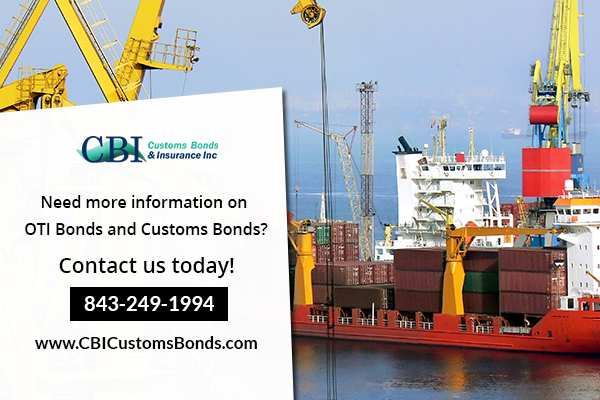How to Purchase Customs Bonds and OTI Bonds?
by Samuel C. Customs AdvisorInternational freight shipping is a complicated process that makes possible the transaction of goods from one country to another. This opens doors for traders to sell the same products in higher value thus they make more profits. Before the 21st century, there was the only medium of international trading and that was through big ocean ships. However, it has evolved and expanded steadily as now there are other modes such as air freight shipping is also available. Customs bonds NY play a vital role for importers and exports in the process.
OTI Bonds NY are associated with all ocean freight forwarders and non-vessel-operating common carriers (NVOCCs). US-based NVOCCs and OFFs have to obtain this bond to operate as licensed Ocean Transportation Intermediaries. These bonds act as insurance policies for different parties and are asked by U.S. government agencies - FMC and CBP.
An OTI bond is required by Federal Maritime Commission (FMC) to guarantee that the OTI will comply with all federal rules and regulations and it also protect the shippers and carriers partnering with OTIs for any financial risks.

Obtaining OTI Bonds
Obtaining OTI Bonds is not a simple task for a new freight forwarding company owners and individuals. The licensees are required to produce sufficient financial statements. You need to approach a reputed surety bond company to obtain these bonds. License holders are fully liable for the full value of the bond in case any claim occurs. In case you feel unsatisfied with the information given on this page regarding the bonding process, you may contact customs brokers for an expert opinion.
Purchasing Custom Bonds
There are mainly two types of bonds – Continuous Customs Bond and Single Entry Bond. They are also like an insurance policy that guarantees to customs and border protection agency all the payment of duties, taxes, and fines levied on a shipment that is importing to the US. Single entry bond covers one entry of imports in the country while continuous customs bond is for the purpose of multiple transactions in a year.
In case of continuous customs bonds, importers do not require to file additional Importer Security Filing (ISF) Bond on file regardless of the total value of the imported shipment. Individuals who hold these bonds are known as the principal, while CBP acts as obligee (beneficiary). The surety company pays the full bond amount in case of the shipment fall under the prohibited category, infringes rules, and fails to pay taxes and duties within the due date.
You can make this challenging process of purchasing bonds simple and smooth by reaching to one the reputed surety agencies or customs brokers. They possess extensive knowledge about each step to be followed to acquire bonds.Sponsor Ads
Created on Jun 14th 2019 02:32. Viewed 455 times.



